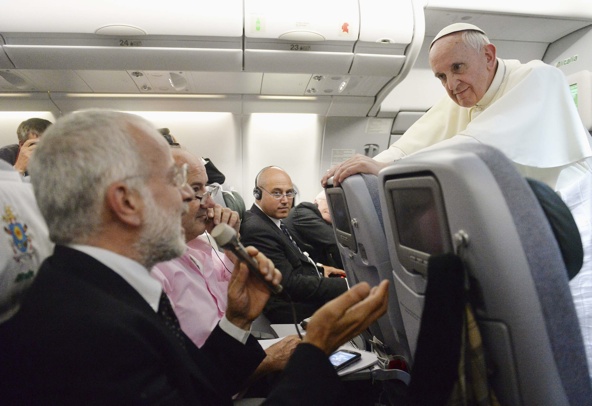
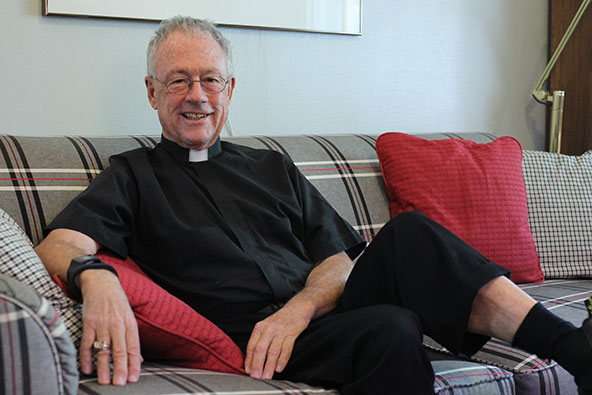
Pope Francis sat down with Jesuit Father Antonio Spadaro for an extensive interview for the Italian Journal La Civilita Cattolica, America Magazine and other Jesuit publications. The interview covered topics from his papal apartment to Fellini films.
What the Holy Father said about abortion attracted the lion’s share of the media coverage, but the 12,000-word interview cannot be captured in sound bites.
“We cannot insist only on issues related to abortion, gay marriage and the use of contraceptive methods,” the pope said. “The teaching of the Church, for that matter, is clear and I am a son of the Church, but it is not necessary to talk about these issues all the time.”
He described himself as “a sinner,” said his preferred form of prayer is adoration before the Blessed Sacrament, and stressed the Jesuit tradition of finding God in all things.
To get deeper into this much-discussed interview, The Catholic Sun sat down with Jesuit Father Edward Reese, president of Brophy College Preparatory. Fr. Reese finds God in all things, too, including his two dogs and his fish, which keep him company in his office.
Fr. Reese sat on his couch, a statuette of St. Ignatius Loyola on the coffee table before him. The first question Fr. Reese answers is the first question Fr. Spardo asked Pope Francis:
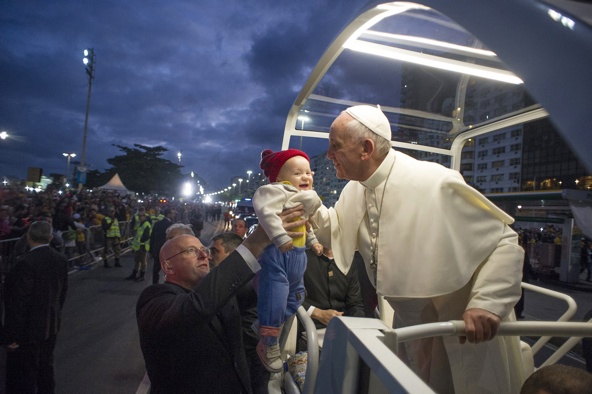
Q: Who is Jorge Mario Bergoglio?
“He’s a brother Jesuit. I’m not unique in saying this. A lot of Jesuits that I know have said that [the interview] sounds like a bunch of us sitting around having coffee. It wasn’t a pronouncement. It was a couple brothers sitting around and discussing their beliefs and even movies. I think it’s significant that Pope Francis approved the interview. It’s not only what he said, but what he wanted people to hear,” Fr. Reese said.
“I’ve never met him, but he could probably come in and sit down and we would have had common experiences, we’d feel at home with one another. Any group of Jesuits would feel the same way. Clearly he’s a person who wants to be with people, particularly the poor. He’s comfortable admitting his own mistakes, which is something we Jesuits always try to do. He’s pastoral more than academic. I love his image that the shepherd should smell like the sheep. That seems to be who he is.”
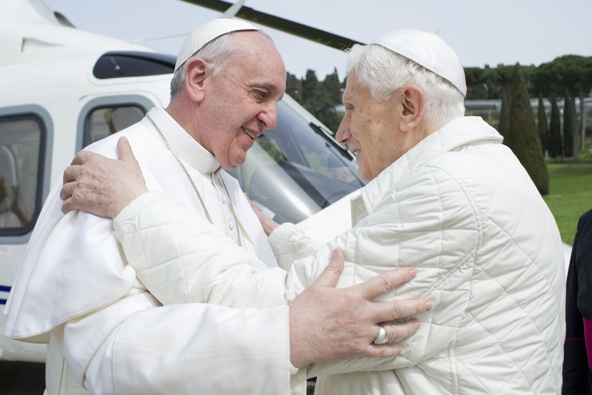
Q: So many have spoken of the differences between Pope Francis and his predecessors, but how much can be attributed to the pope being the first from the New World?
Fr. Reese said that his place of origin explains a lot.
“The College of Cardinals and ultimately the Holy Spirit [were] ready for a non-European, [were] ready for someone from a different continent, from a different point of view. He looks at things differently because he’s from South America.
“It’s his style. The previous two popes were professors, and by all reports, very good professors. But they talked like a European-style professor or like a lawyer presenting a brief. They were very good at it. But [Pope Francis] talks more like a poet or like a painter or like a mother explaining something to her children. And it’s a good time in the Church to have someone like that.”
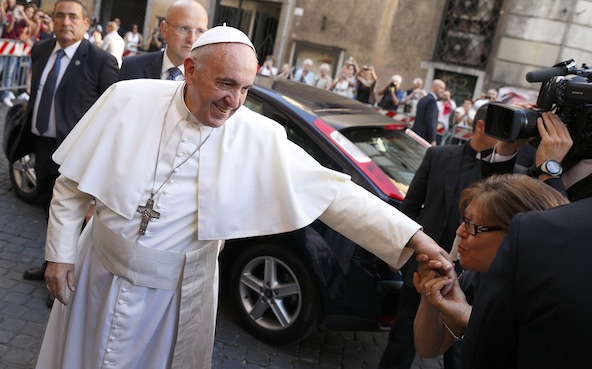
Q: So is this a change in teaching or a change in emphasis?
“It’s a change in emphasis and it’s significant in that it’s a point of view,” Fr. Reese said.
He underscored Pope Francis’ image of the Church as a field hospital.
“It is useless to ask a seriously injured person if he has high cholesterol and about the level of his blood sugars,” the pope said in the interview. “You have to heal his wounds. Then we can talk about everything else. Heal the wounds, heal the wounds…”
Fr. Reese also noted what Pope Francis said about those with same-sex attraction as he traveled on a plane back to Rome from World Youth Day. “Who am I to judge?” the pope said.
“What he said, using his words, he said the field hospital. He used the imagery of a mother. On the airplane, ‘A gay person who is seeking God, who is of good will — well, who am I to judge him?’
“He comes back to ‘Jesus loves you,’” Fr. Reese said. “We all believe that. Every Christian believes all those things. It’s just that he has emphasized those things and that’s his stand. If someone is dying in a field hospital you don’t talk to them about their cholesterol level. We tell them everything is going to be OK, God loves you, we’re going to do everything we can to save your life. And that should be the stance of the Church, certainly in this day and age.”
Fr. Reese continued: “A mom, when a child comes home for Thanksgiving, gives him a big hug and loves him. She may not like his earring or the color of her daughter’s hair, but she just loves them. It’s like Jesus.
“Jesus knew the woman washing His feet was a sinner. But He loved her. And He told her He forgave her sins. He didn’t say, ‘You’re not a sinner.’ And of course that was in the context of people that thought they were better than her. And Jesus was pretty straight with them. I think that’s the way that Francis has focused the message.
“The press is going to focus on certain things, but [Pope Francis] said them. He’s astute enough to know what the press is going to pick up. That’s really why he’s saying, that the first thing out of the Church shouldn’t necessarily be the rules and regulations; the first thing should be ‘Jesus loves you.’ The Good News. That Jesus preached the Gospel, the Good News. And it should sound like good news to people. It should sound like Gospel.”
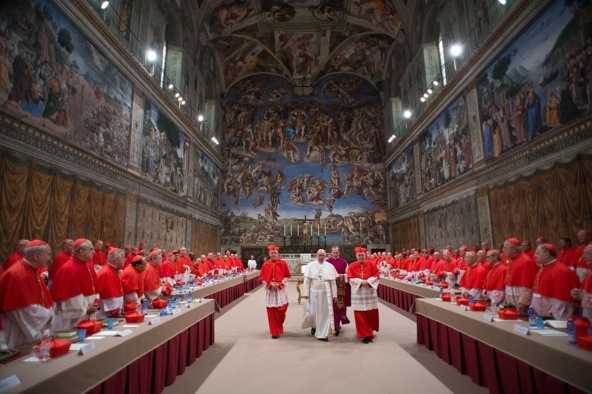
Q: What does Pope Francis mean by ‘Thinking with the Church’?
“What he understands as Church is that we are all Church. We have confused hierarchy and Church. They’re not the same. We are all the Church. So when we say the Church needs reform, we all need reform. When the Church needs to be more holy, we all need to be more holy. And he says we all need to listen to the Church, we need to listen to everyone,” Fr. Reese said.
“We need to listen to the struggling woman who’s unmarried and has a child. She is every bit as much of the Church as the cardinals in Rome. The person struggling to raise his or her children in the Church needs to be listened to. The person who is estranged from the Church is part of the Church that needs to be listened to. To listen to the Church, to think with the Church — that is extremely profound and I think was what Jesus said.

Q: Another striking aspect of the interview is how the pope speaks about the arts. He’s obviously a learned man. Yet while he talks about the arts, but he never forgets the poor. How does that come into play here at Brophy?
“Everyone should have access to the arts, including the poor. That’s why we have our Loyola Academy, to give kids an opportunity to have a Jesuit education. Ignatius would start always insist on building schools for the poor. Some people have said it’s just symbolism (with the pope): He rides the bus, he delivers his own laundry. Yeah, it is. But symbolism is pretty important. And I think we got a glimpse of that going back to who’s the Church. The very first thing he did was bend down and ask those people to pray for him from the balcony, before he blessed them. He more often refers to himself as the bishop of Rome than the head of the Universal Church. That’s pretty significant. A lot of what we do in the Church is symbolism.
“The finding God in all things is really something we try to inculcate at Brophy and at all Jesuit schools. Finding God in all things, there are ramifications if you really mean that at an educational institution. Everything you do should be done well and with reverence. So if it’s a football team, if it’s cooking club, if it’s a theology class, if it’s a liturgical celebration, all those things, because God is present, should be done as well as you possibly can. And that’s why the academic side of the school is rigorous and is taken [seriously]. That’s why if you’re going to be on the lacrosse team, the coaches call you to do the best you can. All these things, for me anyway, the fish and the dogs, remind me of God’s presence anyway. And I’m pretty sure they’ll be fishes and dogs in heaven. I probably should have been a Franciscan.”
“We do a lot of immersion programs and things like that here, where kids go and live with the poor. It’s not about these great kids from Phoenix coming here to help us. No. It’s for us, so that we can learn from the poor. That’s what I hear from that interview and I think what he’s saying with his actions. I think that’s a good thing for all of us to do.”
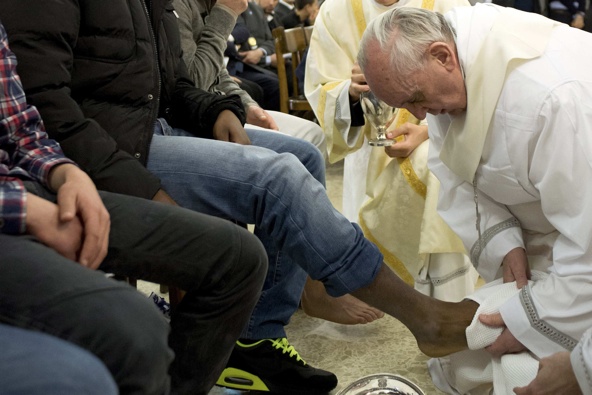
Q: How will Pope Francis’ emphasis change how we act as Catholics?
“Call me back in two years,” Fr. Reese quips. “What I see, right now, it’s an attitude. He’s just reminding us of things the bishops, the popes all have said. He’s just reminding us from a different point of view that God loves us. And that we’re inherently good because we are human beings. He’s reminding us of that. And I think that is going remind us all, especially the leadership, the ones that have the specific mission of preaching, that it’s good news, not just rules and regulations. And the good news is very simple: God loves you. If that’s your starting point… You don’t want to burry your lead. And he knows that. Somewhere in his DNA is a journalist. He doesn’t bury his lead. Every time he goes out he says, ‘God loves you.’ The whole story can be told in the lead. That is going to affect the Church. It already has.”
“I go to physical therapy and the physical therapist said to me, ‘The Catholic Church has a lot of rules, don’t they?’ What made a Catholic when I was a little kid was that we didn’t eat meat on Friday. That’s what made a Catholic. Well, what about ‘They will know they are Christians by their love.’ The cardinals did a good job and picked someone who will lead us by his words, by his example, by his emphasis on certain things. The Church should be of service, as Jesus was, and the Church should tell us how much God loves us, as Jesus did. The other stuff will work itself out through the Church, and the Church is all of us.”





